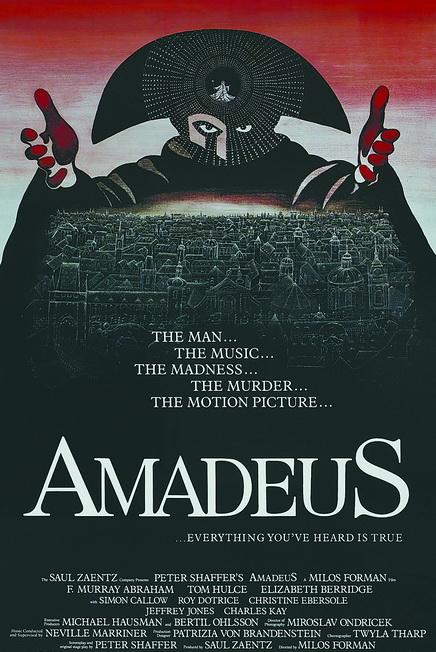The film "The Biography of Mozart", released in 1984, is the key for many friends around me to enter the world of classical music. From the perspective of Mozart's predecessor and competitor Salieri, the film looks back at Mozart's short and legendary life, interspersed with symphonies, operas, piano concertos and masses of the talented musician, advancing the plot and setting off the atmosphere. The serenade of thirteen wind instruments that appeared in the film, although it was not Mozart's most famous work, was especially memorable to me.

Poster for the movie Mozart
After the release of "The Biography of Mozart", it caused a hot discussion and won eight awards such as "Best Picture" and "Best Director" at the Following Year's Oscars. Biographical films based on the life experiences of composers are often passed on by word of mouth among music lovers, making it easier to please audiences unfamiliar with classical music, and Czech director Milos Foreman is clearly not satisfied with making a film just for classical fans or for Mozart's fans, he wants it not only to have music, but also to reflect the light and darkness of human nature.
This film, which looks back at the life of musical genius Mozart, is not entirely historical. In the film, the composer Salieri, who was also active in Vienna in the 18th century with Mozart, became the biggest villain. He was jealous of Mozart's outstanding musical talent, and resented that he could not write the same exquisite and moving melody, so he framed or tortured this unworldly musical genius again and again: shortening the performance cycle of Mozart's operas, deleting the works of this genius's descendant, and even pretending to be Mozart's strict father, constantly torturing the seriously ill Mozart with endless spiritual torture... Although the historical Salieri was not such a vicious character at all (he was famous in the music industry at that time, was the director of the first conservatory in Vienna, and also served as a teacher for Beethoven and Schubert), the director reduced Salieri and Mozart to two diametrically opposed sides (one evil and one right, one vicious and one really true) based on the rumors of later generations, which actually strengthened the dramatic tension in the film, leading the viewer to reflect on and lament the current situation and life.
The literal translation of the title is "Amadeus", which means "God's darling" in Italian. The reason why Salieri is deeply jealous of Mozart is not only that he hates Mozart's pompous appearance and debauched life, not only that Mozart's works are always loved by everyone, but also that he fully understands that Mozart's talent does not come from the world, but is god's grace, but he does not understand why God chose such an unattractive, uncultured, and unusual "strange man" to inherit this rare talent in the world. Shortly after the film, Salerri throws up this question because he accidentally read the classic clarinet-oboe duet in the score of Serenade of Thirteen Wind Instruments.
Serenade of Thirteen Wind Instruments, composed between 1780 and 1781, was composed by Mozart when he was twenty-five or six years old. For the average composer, this age is not yet mature, and for Mozart, who was able to write symphonies at the age of eight, he was already a well-trained musician at that age, easily mastering various styles and giving full play to the personality of different instruments to reach a new realm. This seven-movement serenade, also known as the "Grand Suite", was written for the oboe, clarinet, bassoon, French horn and double bass, and the interaction between the clarinet and the oboe in the third movement is particularly popular with fans, and it is also a moving melody in which Salieri is ashamed of himself just by reading the score.
"At first, the song sounded unremarkable... Suddenly, the oboe plays a high note, just a long monophony, floating there, and then the clarinet takes the melody and introduces it into a sweet and joyful situation. In the film, in his later years, Salieri still clearly remembers the indescribable amazement and emotion when he first read Mozart's score. Then, the camera suddenly jumps, the music is rudely interrupted, it turns out that the young and ignorant Mozart took away the score without anyone, and then laughed and played with his playmates. In Saleeri's eyes, Mozart had no idea of cherishing the gifts given by God, and he himself had exhausted half his life to create the melody written by the childish child in front of him. He loves this music, but he hates that this music does not belong to him, such as the love-hate intertwined emotions that run through the whole film, but also highlight the light and darkness of human nature, complex and subtle, difficult to understand.
Mozart was a genius, and Salieri saw himself as "the representative of the mediocre of the whole world." Most geniuses cannot escape the torment of fate, but mediocre talents are often happy. If you choose, are you willing to bear the struggle and pain of the genius destiny, or do you prefer to live a life of mediocrity and leisure?
(Original title: Genius and Mediocrity)
Source: Beijing Daily
Process Edit: u010
Copyright Notice: The text copyright belongs to The Beijing News Group and may not be reproduced or adapted without permission.